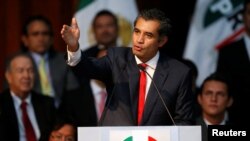The head of Mexico's ruling Institutional Revolutionary Party (PRI) said on Monday that the PRI's method for choosing its presidential candidate needs a shakeup, ahead of a key gathering this week when PRI members will decide on changing the rules.
Any change to the current system to allow a non-party, non-elected figure to helm the PRI's presidential ticket is widely seen as benefiting Finance Minister Jose Antonio Meade, who has served various cabinet posts in both PRI and conservative National Action Party (PAN) governments.
If PRI party members open a path on Saturday for the finance minister to compete in next year's election, the bookish, technocratic Meade is likely to face current presidential front-runner, combative leftist Andres Manuel Lopez Obrador.
"The era of [electoral] locks is over," PRI President Enrique Ochoa told El Universal newspaper in an interview published on Monday, referring to mechanisms to prevent non-party members from heading the party's ticket. "There is a proposal from various groups within the PRI ... to loosen requirements so that supporters can participate."
Meade, who is also seen as a possible candidate to replace Banco de Mexico Governor Agustin Carstens when he steps down later this year, has never been elected to public office, but he has also never been tarnished by allegations of graft.
Some in the party believe Meade represents the PRI's best chance of retaining the presidency in the 2018 election.
Backing for the centrist PRI has gradually crumbled since President Enrique Pena Nieto took office in December 2012 because of anger over corruption, resurgent gang violence and tepid economic growth.
The PRI is running in third place ahead of the 2018 vote, well behind Lopez Obrador's National Regeneration Movement (MORENA), a July poll showed.
The survey revealed that Lopez Obrador's closest rival in the match-ups, trailing by between two and five points, was PAN hopeful Margarita Zavala, the wife of Mexico's previous President Felipe Calderon.
A victory for the nationalist-leaning Lopez Obrador, who is feared and even loathed by Mexico's business elite, could stoke tensions with the Trump administration just as the United States, Mexico and Canada seek to seal a renegotiation of the North American Free Trade Agreement.





